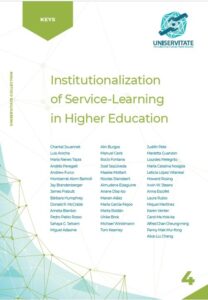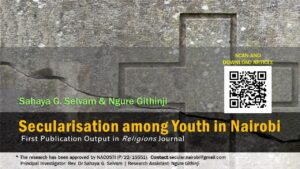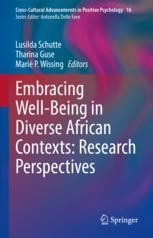 Fadiji, A.W., Khumalo, I., & Selvam, S.G. (2023). The well-being correlates of religious commitment amongst South African and Kenyan students. South African Journal of Psychology. https://doi.org/10.1177/00812463231199960
Fadiji, A.W., Khumalo, I., & Selvam, S.G. (2023). The well-being correlates of religious commitment amongst South African and Kenyan students. South African Journal of Psychology. https://doi.org/10.1177/00812463231199960
Religious commitment is a prominent feature in the lives of many students in Africa. The present study investigated the well-being correlates (emotional well-being, social contribution, and depression) of religious commitment, and compared them across sex. A cross-sectional sample of 471 students from South Africa and Kenya (men = 244; women = 227; with an average age of 22.8 years) completed the Religious Commitment Inventory, Patient Health Questionnaire, Social Well-being Scale, and Mental Health Continuum Short-Form. Structural equation modelling in Mplus was used to estimate direct effects of religious commitment on emotional well-being, social contribution and depression, and comparison across sex. The results showed significant direct effects, attesting to the association […]
Articles/Chapters
Articles
The Role of University President in Institutionalisation of Service Learning
 The Role of University President in Institutionalisation of Service Learning in Higher Education
The Role of University President in Institutionalisation of Service Learning in Higher Education
Citation: Selvam, S.G. (2023). The Role of University President in Institutionalisation of Service Learning in Higher Education. In Chantal J., et al. Institutionalization of Service-Learning in Higher Education, (pp.199-219). Buenos Aires: CLAYSS.
Abstract
Service Learning (SL) is understood as a reciprocal relationship between the learners and the beneficiaries of a social engagement initiative run by the learners, in which the learners are accompanied by the lecturer to integrate the encounter into their mainstream learning by means of systematic reflection. This method of teaching and learning is becoming a common phenomenon in institutions of higher education across the globe. In order to make it sustainable, the initiatives and processes around SL need to be institutionalised. The aim of this book-chapter is to reflect on the role of the University President in the implementation and […]
Secularisation among Lapsed-Christian Youth in Nairobi
 Secularisation and Spirituality among Lapsed-Christian Young Adults in Nairobi: An Exploratory Study of the Antecedents, Triggers, and Response
Secularisation and Spirituality among Lapsed-Christian Young Adults in Nairobi: An Exploratory Study of the Antecedents, Triggers, and Response
Abstract
African scholars have claimed that African peoples are “notoriously religious”. Is this still the case? Empirical literature on the subject is meagre. Therefore, the objective of this study was to examine the antecedents, triggers and response of secularisation and spirituality among lapsed-Christian young adults in Nairobi, Kenya, the participants were aged between 18 and 35, who were baptised but have abandoned Christian faith in favour of secularisation or non-affiliated spirituality. Qualitative data, from semi-structured in-depth interviews among the 14 participants, sampled through a snowball process, was recorded, transcribed verbatim, and analysed by the two authors. Eleven emerging themes were identified from 10 h of data. The first two themes […]
Pastoral Supervision: Managing Psychosocial Challenges in Priestly Ministry
 Pastoral Supervision: Managing Psychosocial Challenges in Priestly Ministry
Pastoral Supervision: Managing Psychosocial Challenges in Priestly Ministry
Selvam, S.G. (2022). Pastoral Supervision: Managing Psychosocial Challenges in Priestly Ministry. In S. Fernando, J. & Jeyaraj, (eds.) Care for the Priests (pp.21-34). Chennai: Don Bosco Publications.
Engagement in pastoral commitments involves intrapersonal and interpersonal experiences of psychosocial nature. These include: dynamics of euphoria and dysphoria following public engagements, emotional overload and affective enmeshment, transference and counter-transference, and power disparity. Priests, especially those young in ministry, might mistake these states for boredom, depression, temptations, and discouragement. Seminary formation does not prepare them adequately to handle these nuanced experiences. Without understanding what is happening to them, they might get into a downward spiral of addictions and unhealthy relationships. What could be a support system that they can rely on. The current chapter proposes pastoral supervision as an […]
Conceptualising and Measuring Hospitality in Relation to Wellbeing in Kenya: Is Hospitality a Character Strength?
{{unknown}} Conceptualising and Measuring Hospitality in Relation to Wellbeing in Kenya: Is Hospitality a Character Strength?
Conceptualising and Measuring Hospitality in Relation to Wellbeing in Kenya: Is Hospitality a Character Strength?
Sahaya G. Selvam,
Joyce Wanjiru Kiige &
Jeketule Soko
Part of the Cross-Cultural Advancements in Positive Psychology book series (CAPP,volume 16)
ABSTRACT
Hospitality is recognised as a salient value across most cultures, including in Africa. Yet, empirical research is narrowly focused on the hospitality industry. Psychological studies on hospitality are lacking. Therefore, the present research, consisting of three studies, explored hospitality within the theoretical framework of character strengths and wellbeing. Study 1 examined the perception of hospitality among several ethnic groups in Kenya and identified dimensions that define hospitality: spending time with guests, enjoying their presence, having long conversations, not being disturbed when guests arrive unannounced, welcoming them in one’s residence, providing good food, making sacrifices to make them feel at home, and providing comfortable accommodation. Based on the qualitative data, in Study 2, […]